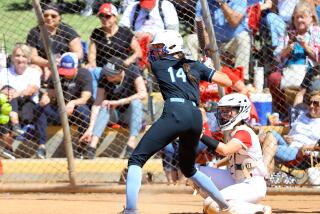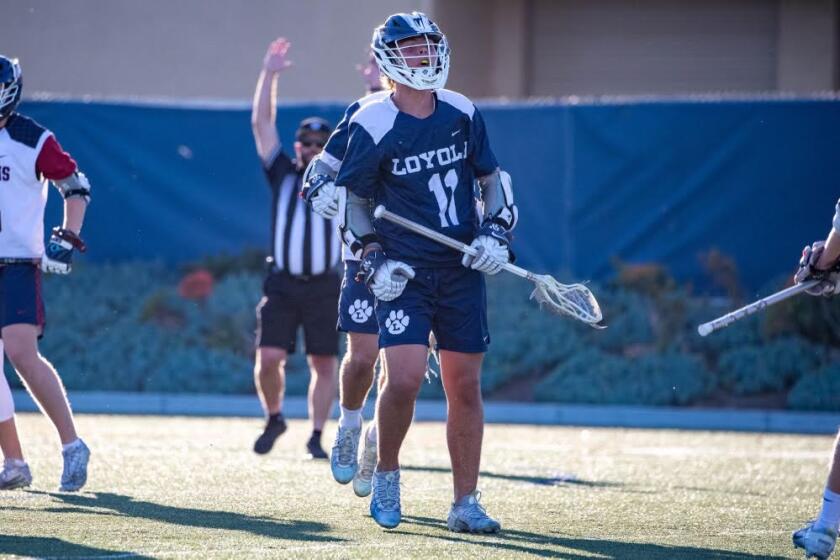A Summer Hit : Softball Players Take a Swing at Serious Fun
- Share via
In the batter’s box is an anxious batter, digging his cleats into the red dirt, his eyes fixed on the pitcher. The home team is pleading, “Come on, we need a hit.”
“Strike one,” the umpire growls.
Where are Shoeless Joe and a field of dreams when you need them?
The batter taps the bat on the plate, then cocks it over his shoulder, anticipating the next pitch. He swings, and the ball sails over the shortstop for a single. The crowd roars.
Well, it’s not exactly a roar . This isn’t Dodger Stadium, though sometimes the emotions may run as high. There aren’t thousands of fans cheering in the stands, only a few friends, family members or co-workers, but the players are no less eager than if a division championship were on the line.
This is recreational softball, operated by city and county recreation departments or sponsored by private companies, and, many recreation officials say, it has more participants than any other recreational sport in Southern California.
Player, System Manager
Bob Avila, a recreational player and a Lockheed computer programmer/system manager, plays in a co-ed slow-pitch league weeknights in Burbank. His team is the Fatal Errors. By day, they work on top-secret government defense systems; by night, batting averages and fielding percentages win their undivided attention.
“I love the game,” says Avila, pitcher and team captain, “and it’s really great because you develop a camaraderie different from what you would experience in a work environment. People are more themselves.”
Just being himself early on a Sunday morning, Bill Wexler warms up with his teammates at Veterans Memorial Park in Culver City. Wexler, the self-proclaimed “star third baseman” of B&B; Hardware, also plays Thursday nights for a team in the San Fernando Valley.
Wexler is 70 years old. Softball leagues for players 55 and older are plentiful from El Segundo to Encino. “When you’re out on that field you forget your age . . . though sometimes you’re a little tired when you’re finished,” Wexler says, chuckling.
On an adjacent field, Nate Sacks, 68, warms up his pitching arm with a teammate. He’s also the general manager of Schaeffer Magnetics, where the average age is “about 64 or 65.”
“It’s a great part of my life,” says Sacks, one of the original players in the 12-year-old league. “There’s something about putting on a uniform; it transforms a person. You see guys who can hardly walk . . . they put on a uniform and they’re out there running around like a crazy person.”
Five teams, with an average of 12 players each, suit up for the Culver City 55-and-over softball league from March through September. New players are welcome to join any time during the season, if there’s room.
For most players, Sacks says, it’s an opportunity for companionship, to “be competitive, get some exercise and relax.”
“But the way some of the guys play,” Sacks says with a grin, “you’d never think of it as relaxing.”
The psychological victories from sports score as high as the physical benefits with other players as well.
Mickey Davis thinks so, and Davis, who has a master’s degree in education with a psychology emphasis from Whittier College, ought to know. Kind of the Shoeless Joe Jackson of softball, she’s made a career out of the game, beginning with amateur play in the ‘60s and four years in the Women’s Professional Fast Pitch League in the ‘70s, which in 1984 landed her in the National Softball Hall of Fame in Oklahoma City.
These days, Davis conducts softball clinics around the country and promotes the game through her work. She was Olympic Committee program director for Youth Services during the 1984 Olympics, and more recently, she’s been involved with the annual Coors Invitational slow-pitch tournament in Denver, coming up in July.
The humble Hall of Famer is an affable woman with a businesslike coif and a million anecdotes from her days as a barefoot catcher in South Carolina. To her, softball is more than just a game. Her own experiences--from player to coach to corporate spokesperson--tell her a little healthy competition can go along way.
Life Skills Learned
“I credit softball with giving me my people skills and the skills to do everything I’ve done in marketing,” Davis says to cover all the bases. “And I think the value that you get from a team sport can be carried over into the workplace and over into other parts of your life.”
This is especially true for women, Davis reasons, because they are less likely to have been exposed to the concepts of teamwork and competition while growing up.
“You learn to negotiate, to be a part of the team,” Davis says. “You learn to bargain, you learn strategy, you learn what your role is and what the roles are around you.
“You also learn who the players are, literally and figuratively,” Davis adds, grinning slyly.
Some weekend players still believe it’s just a great way to have fun and a chance to socialize. There are a variety of leagues and levels for co-ed, youth, men’s and women’s slow-pitch and fast-pitch teams to choose from. To join a team, the best place to start, according to administrators in charge of county and city programs, is to go to the nearest field and talk to team managers.
To find out when and where the games are, call parks and recreation departments “and we’ll tell you where the teams are playing,” says Lois Maki of the L.A. Valley Region. Or, Maki says, “call at the beginning of July (for fall league) and we’ll put your name on our free agent list.”
Teams will call recreation offices for names when they need players, Maki says. “We get the most calls for women to play for co-ed teams,” she adds.
A Looser Attitude
“Co-ed is more fun for me,” says the Fatal Errors’ Avila, who plays on men’s and co-ed teams. “People are more loose. For men, it’s not their nature to show that looseness. Men’s teams tend to be more serious--not that co-ed is less serious, it’s just the nature of the game that makes it fun.”
Softball doesn’t have to be any more strenuous than loping to first base or lifting a glass at the nearest pizza joint--softball players are notorious for stuffing themselves with pepperoni while recapping the game.
But, as Davis points out, there are misconceptions about the seriousness of the sport: “A lot of people view softball as the lazy person’s sport, because you just stand out there and you only move when the ball comes to you. That’s not true. You can and should be moving on every pitch.”
But it’s up to the individual whether he or she gets physical or just enjoys the exercise and the great outdoors.
Skill Not Critical
“I think anybody 55 and up playing some kind of sports is always good,” Nate Sacks says. “I’m always encouraging people to get out and play, even if they aren’t any good.”
Marci Schurman, normally a mild-mannered kindergarten teacher in Pasadena, on Sundays plays a pretty mean second base for the Golden State Landscaping Bushwhackers, an A Division women’s fast-pitch team.
Though she plays in the second-highest skill division (levels range from C to AA), she says her motives are “definitely recreational; I’m not into high-stress competition.”
No Longer a Youngster
“I went for several years without playing ball,” says Schurman, who took the game more seriously in her high school days. “When I came back, my first couple of years playing caused some anxiety because I wasn’t sure I could do it at my age. I wasn’t a little teen-age whippersnapper any more.” She was 25 at the time.
Now that Schurman’s skills and judgment are well oiled, her confidence has returned.
“I love it, and it builds my self-esteem a little bit. When you’re having an on day and you do something that contributes to a win, it makes you feel worthwhile--everybody needs that.”
Teammate Linda Moule, who is also coach of the 1989 1A CIF softball champions from Agoura High School, agrees: “I think it’s a great game. It’s not as aerobic as basketball or soccer, but there’s strategy involved, and it’s got to build self-esteem.
Anything Can Happen
“It may help when interacting with people outside of softball,” she says. “It might teach you to get along with people a little better.”
But the best part about the game is that anything can happen.
“You’re never out of the game. In basketball, if you’re 20 points behind and there’s a minute left, you won’t have time to come back, but in softball, you’re never out of the game until the last out. You can be down 20 runs and come back and win.”
Players who find league play too confining have another option: slow-pitch tournament teams. Tournament teams travel around to organized slow-pitch tournaments on the weekends, often with new teammates and almost always meeting new opponents. The teams are allowed to pick up players to pad out their rosters, or members of several teams will combine to form a tournament team.
Sue Armitage, who plays third base for the Fatal Errors during the week, is an occasional tournament-team player on weekends.
Softball and Vacation
“It’s something different--you devote an entire weekend to playing softball. If the tournament is far enough away that you have to stay overnight, you not only get a full day of softball, you get a mini-vacation too.”
Eighty tournament teams from 20 states will travel to Denver for the third annual Coors Light Women’s Softball Invitational July 21-23. The tournament began three years ago with 26 teams. The growth of the tournament, Davis says, “mirrors the growth in popularity of women’s softball.”
You can get information about tournament teams from local players, or pick up a copy of Softball, a freebie magazine available at many sporting goods stores.
For information on city and county summer softball leagues, call local parks or recreation departments. County summer leagues begin the first week in July. James Turner, recreation service manager of the Foothill District, says potential players looking for teams can show up at a game the first week or call for information.
L.A. County leagues are divided into seven districts: Foothill, (818) 961-6393; San Gabriel, (818) 965-5868; East Los Angeles, (213) 268-9302; North County (805) 259-1750; Altadena-Malibu, (818) 798-1173; El Camino, (213) 327-2930; Florence-Firestone, (213) 586-6543.
City league seasons vary so call your city’s parks and recreation department; for city of Los Angeles leagues, call: Valley Region, (818) 783-0738; Metro Region, (818) 246-5613; Pacific Region, (213) 485-4871.
More to Read
Go beyond the scoreboard
Get the latest on L.A.'s teams in the daily Sports Report newsletter.
You may occasionally receive promotional content from the Los Angeles Times.










